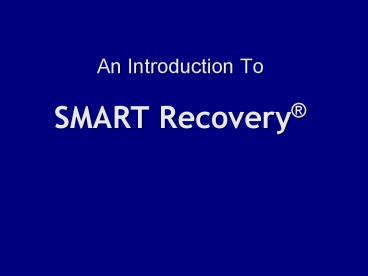An Introduction To SMART Recovery PowerPoint PPT Presentation
1 / 19
Title: An Introduction To SMART Recovery
1
An Introduction ToSMART Recovery
2
What is SMART Recovery?
- SMART stands for Self-Management and Recovery
Training. - SMART is basically a set of tools and skills.
- The free meetings (online and face-to-face) and
discussions are opportunities to learn, practice
and refine these skills.
3
Four-Point Program
- Motivation to Abstain - Enhancing and maintaining
motivation to abstain from addictive behavior - Coping with Urges - Learning how to cope with
urges and cravings - Problem Solving - Using rational ways to manage
thoughts, feelings and behaviors - Lifestyle Balance Balancing short-term and
long-term pleasures and satisfactions in life
4
Final Authority
- SMART views reason and scientific knowledge as
the final authority. - SMART evolves as scientific knowledge evolves.
- A religious or spiritual belief is not required.
- However, many SMART participants hold religious
or spiritual beliefs, although we do not focus on
these in SMART. - At SMART the emphasis is self-empowerment.
5
Four Common Misconceptions About Urges
- Urges are excruciating or unbearable.
- They compel you to use.
- They will not go away until you drink or use.
- They will drive you crazy.
- None of these are true!
6
The Truth About Urges
- There is no evidence to support the four common
misconceptions. - You can resist them and they will get weaker over
time. - When you realize you can stand a little
discomfort, you will be back in control and part
of your problem will be solved immediately.
7
Accepting Urges
- Accept your urges as a normal part of changing
instead of treating them as catastrophes. - You make yourself feel crazy by thinking, I
cant stand this its awful to feel this way
this is too much for me Im losing control of my
emotions and I must be in control.
8
Retraining Your Thoughts
- YOU have control.
- You CAN stand the urges and they DO pass.
- We CAN enhance our comfort and expedite the
process. - Use SMART tools like DISARM, Divert and Stop
Thought. - Find supportive friends in SMART meetings.
9
Increasing Motivation
- Use SMART tools like CBA (Cost/Benefit Analysis),
ABC and Brainstorming - Listen to the voices in your head. SMART builds
up the rational voice and disputes the enemy
voice that encourages us to use. - Commit to short-term sobriety so you can think
clearly while working on recovery. - Commit to attend X number of meetings say two
months - to get to know SMART.
10
Focus on the Positive
- Build on concrete things like developing a VACI
(Vital Absorbing Creative Interest). - SMART prefers to quickly focus on progress and
positive goals. - When recovery feels good we are much more
likely to continue. - Yes! You can feel good during recovery!
11
Managing Thoughts, Feelings, Behaviors
- We expose the irrational excuses we give
ourselves for using, and thus see our lives in a
new way. - We increase our frustration tolerance.
- We can learn to manage our emotions.
- What do you wish your life would look like? Move
toward those goals.
12
SMART Problem-Solving Tools
- ABCs to Dispute Irrational Beliefs
- CBA (Cost/Benefit Analysis)
- Enhanced Frustration Tolerance
- Exchange Vocabulary
- Journaling
- Relaxation
- Brainstorming
- Planning
- among other proven methods
13
Balancing Long-Term and Short-Term Satisfactions
- Stopping an addictive behavior is as easy as just
stopping. - More difficult is learning to live comfortably
without the addictive behavior. - SMART is not about managing away emotions.
- SMART is about learning to balance and appreciate
the actual significance of emotions.
14
Happiness is a Planned Activity
- Many people find they experience a wider range of
emotions and feel more alive emotionally, yet
they find this need not create problems or be
disturbing. - In this way you can build a happy, healthy
lifestyle based on your personally chosen
values and goals.
15
Thoughts gt Beliefs gtFeelings gt Actions
- People and situations cannot make you feel a
certain way. - Your reaction to them is what makes you feel that
way. - This is the critical principle of SMART, and the
cornerstone of the ABC process, which we use to
test the rationality of our thoughts and beliefs. - YOU control YOU!
16
If You Lapse or Relapse
- Come discuss what happened.
- Lapses are not a point to start over, but a point
to get back on the horse and keep riding. - We dont start over at day zero weve learned
too much to say were starting from scratch. - For us, change looks more like an upward spiral
than a straight line.
17
Crosstalk is Encouraged
- Discussion amongst participants is encouraged,
and proven effective. - Or simply sit back and listen.
- You make the choices this is not a pressure
group. - SMART tools are illustrated and practiced BEST on
real-life situations.
18
What Can I Do Next?
- Watch the ABC Tutorial slide show.
- Watch the CBA Tutorial slide show.
- Post a message on our message board and introduce
yourself! - Attend an online meeting.
- Read about SMART Recovery Tools.
- Order books from our Online Bookstore.
19
Thank You!
- Thank you for your interest inSMART Recovery

